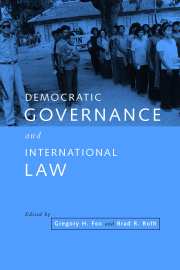Book contents
- Frontmatter
- Contents
- List of contributors
- List of acknowledgments
- Introduction: the spread of liberal democracy and its implications for international law
- PART I THE NORMATIVE FOUNDATIONS OF A RIGHT TO POLITICAL PARTICIPATION
- PART II DEMOCRACY AND INTER-STATE RELATIONS
- PART III DEMOCRACY AND THE USE OF FORCE
- PART IV DEMOCRATIZATION AND CONFLICTING IMPERATIVES
- PART V CRITICAL APPROACHES
- 17 Evaluating democratic progress
- 18 What kind of democracy does the “democratic entitlement” entail?
- 19 International law, democracy, and the end of history
- Index
19 - International law, democracy, and the end of history
Published online by Cambridge University Press: 04 May 2010
- Frontmatter
- Contents
- List of contributors
- List of acknowledgments
- Introduction: the spread of liberal democracy and its implications for international law
- PART I THE NORMATIVE FOUNDATIONS OF A RIGHT TO POLITICAL PARTICIPATION
- PART II DEMOCRACY AND INTER-STATE RELATIONS
- PART III DEMOCRACY AND THE USE OF FORCE
- PART IV DEMOCRATIZATION AND CONFLICTING IMPERATIVES
- PART V CRITICAL APPROACHES
- 17 Evaluating democratic progress
- 18 What kind of democracy does the “democratic entitlement” entail?
- 19 International law, democracy, and the end of history
- Index
Summary
Democracy used to be a word that international legal commentators preferred to avoid. At least by the second half of the present century, this was not because too few governments identified themselves as democratic. It was rather because too many did so. The world's most repressive regimes joined their more representative counterparts in claiming a title that had become synonymous with praiseworthy and justified politics. In some cases modifying adjectives were used (“one-party democracy,” “people's democracy,” etc.); in other cases the appropriation was unmodified. Either way, observers found normative inferences difficult to draw, for democracy appeared to mean everything, and therefore nothing.
What put an end to the commentators' reticence was, of course, the demise of Communism and the turn in all regions of the world to multiparty electoral politics. For many, these events confirmed both that democracy was the foundation of political legitimacy, and that repressive regimes, whatever they chose to call themselves, lacked that legitimacy. Influential international legal scholars felt able to declare that a “right of democratic governance” was now “emerging,” and that international law was, or at any rate should now be, beginning to take in the lessons of “liberal internationalism.”
This chapter examines these claims. My concern is not to affirm or deny that State practice and opinio juris square with an emerging right of democratic governance. I shall not present the evidence relevant to deciding that doctrinal question, and will offer no conclusion with respect to it.
- Type
- Chapter
- Information
- Democratic Governance and International Law , pp. 532 - 566Publisher: Cambridge University PressPrint publication year: 2000
- 4
- Cited by



